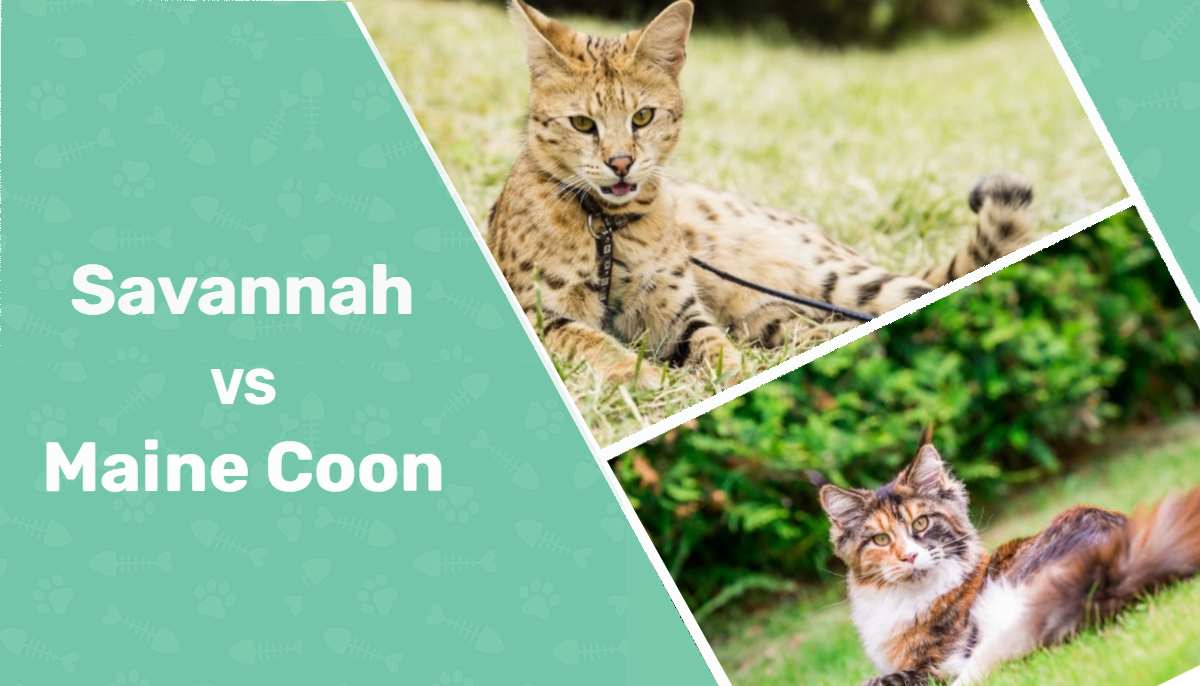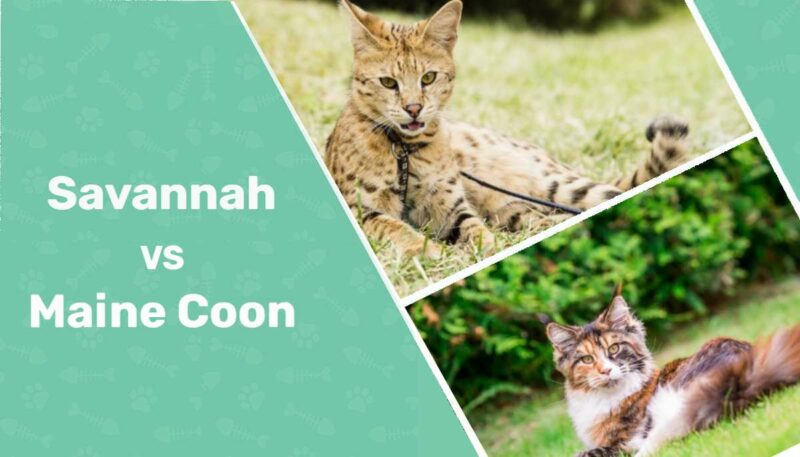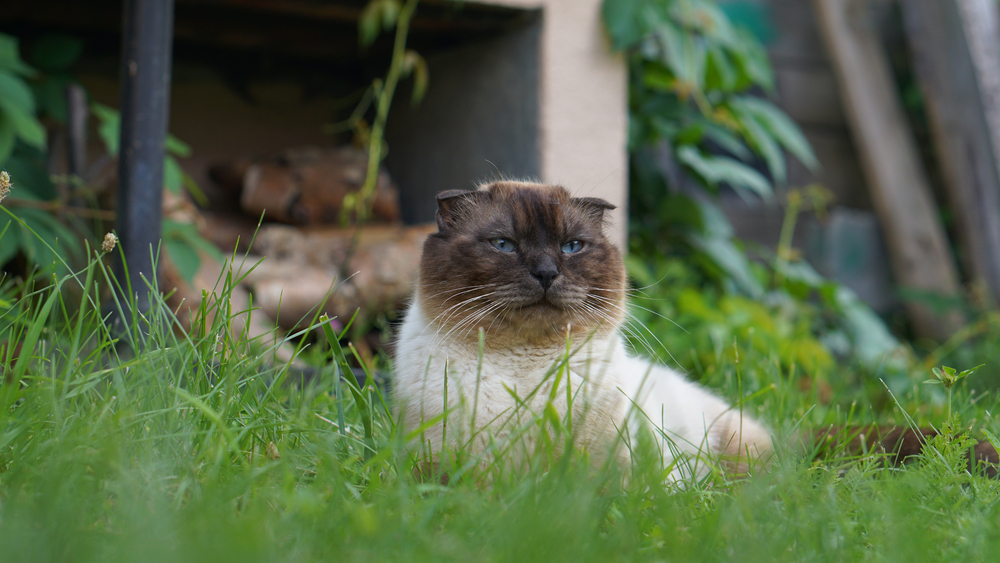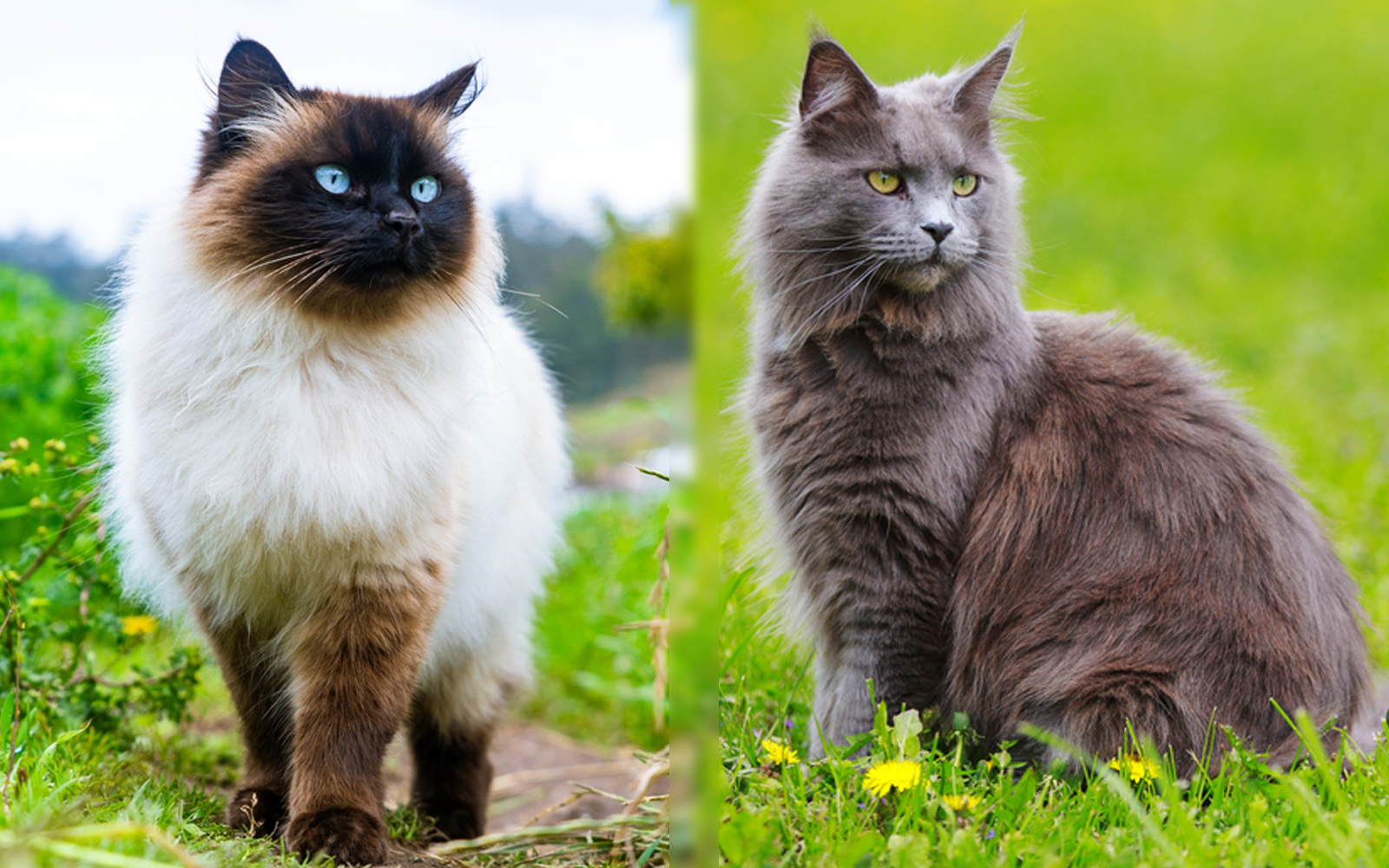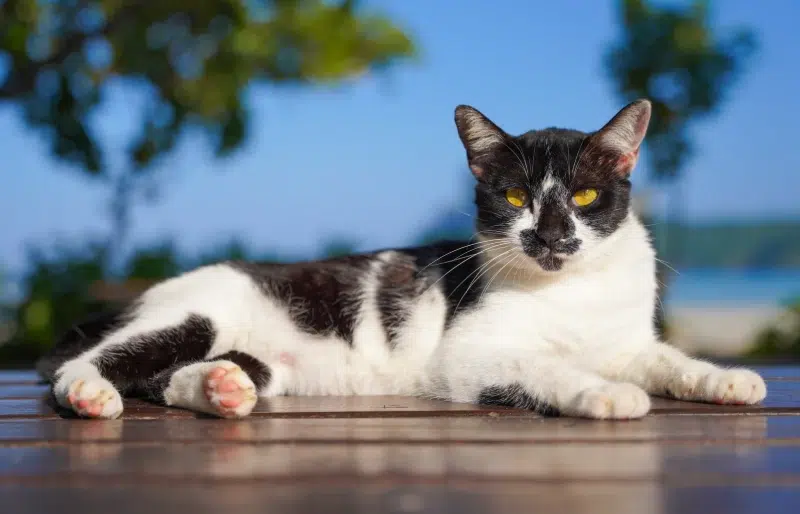Click to Skip Ahead
When choosing a feline companion, two distinctive, unique breeds are the Savannah and the Maine Coon. At first glance, it’s easy to see the differences in appearance, but there is so much more to them than meets the eye.
With their wild African ancestry, the Savannah is a relatively new breed but popular for their exotic appearance and friendly nature. The Maine Coon, a hardy cat beloved for their amiable personality, has long been a favorite and is one of the most popular cat breeds today.
While the Savannah Cat brings excitement and adventure to the home, they aren’t the best choice for first-time cat owners. On the other hand, the Maine Coon is perfect for new pet owners and families.
Keep reading to learn everything you need to know about these two beautiful breeds and see what makes them special.
Visual Differences
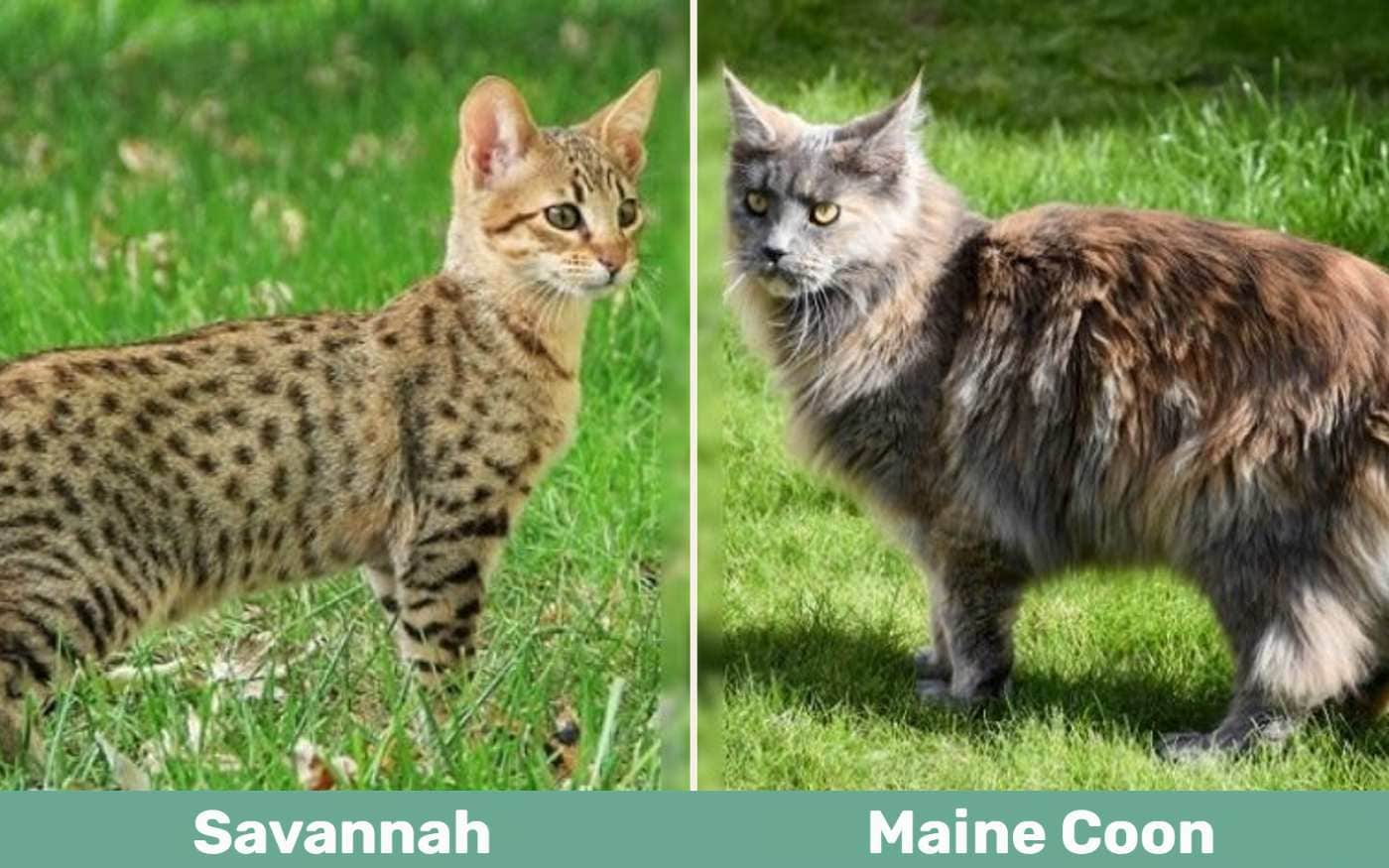
At a Glance
- Average height (adult): 14–17 inches
- Average weight (adult): 12–25 pounds
- Lifespan: 12–20 years
- Exercise: 2+ hours a day
- Grooming needs: Minimal
- Family-friendly: Yes
- Other pet-friendly: Yes, if raised/socialized with them
- Trainability: Intelligent, easy to train, loyal
- Average height (adult): 10–16 inches
- Average weight (adult): 9–18 pounds
- Lifespan: 9–15 years
- Exercise: 1+ hours a day
- Grooming needs: High
- Family-friendly: Yes
- Other pet-friendly: Often
- Trainability: Intelligent, easy to train

Savannah Cat Overview
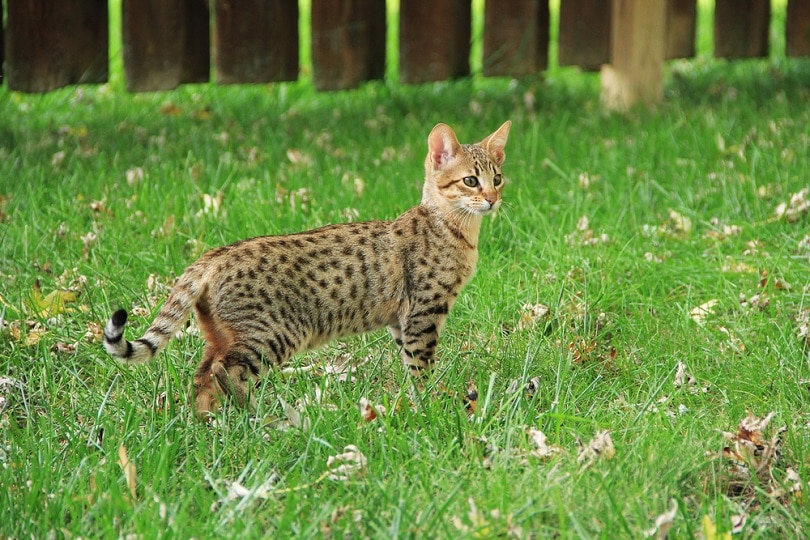
As a hybrid of the Siamese cat and the wild serval, Savannahs have only been around since the late 20th century. Their wild heritage is evident in their large ears, long legs, and signature spotted coat from their African ancestors. The Savannah can grow to a formidable size of up to 25 pounds and 17 inches tall, depending on their generation.
First-generation crosses (F1) are larger than later ones (F2, F3) because they are not as far removed from their original wild ancestors. Later generations are more docile, which is something to consider.
Their striking fur coat is short and dense and comes in colors that range from black to brown spotted tabby to silver spotted tabby. Their distinctive, almond-shaped eyes have a piercing, intelligent look.
Savannah Cats are very athletic and energetic and love to play and hunt. They like a lot of attention and interaction and are unhappy if left alone for long periods.
Although they have many appealing qualities, the Savannah Cat is not recommended for first-time cat owners due to their wild nature. When looking for one, it’s important to check their generation since it can significantly affect their temperament.
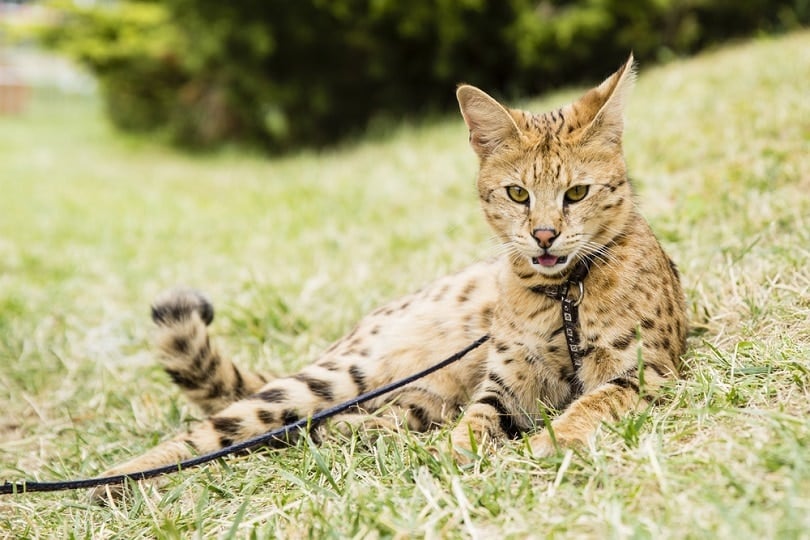
Personality & Character
Intelligence, loyalty, and an exceptional hunting instinct are traits of Savannah cats. They can be highly territorial, and once they bond with their owners, they will stick close by. They can be very vocal and express themselves with various sounds. You may find yourself having a conversation with them as you go about your day!
If you want a cat that is content to stay in your lap all day, you’d better look elsewhere. Savannahs are incredibly energetic, with a high prey instinct that will keep them prowling and pouncing all day.
Your Savannah may want to join you for a bath or a romp in the kiddie pool since they love water. In some ways, they are more like a dog than a cat. With their active and adventurous nature, Savannah Cats love to jump up on top of high perches and explore.
They have an impressive 8-foot vertical leap, so be aware of that when finding a safe place for any delicate items or plants. To make your home a Savannah haven, make sure there are a variety of toys, a good cat tree, and plenty of space to play.
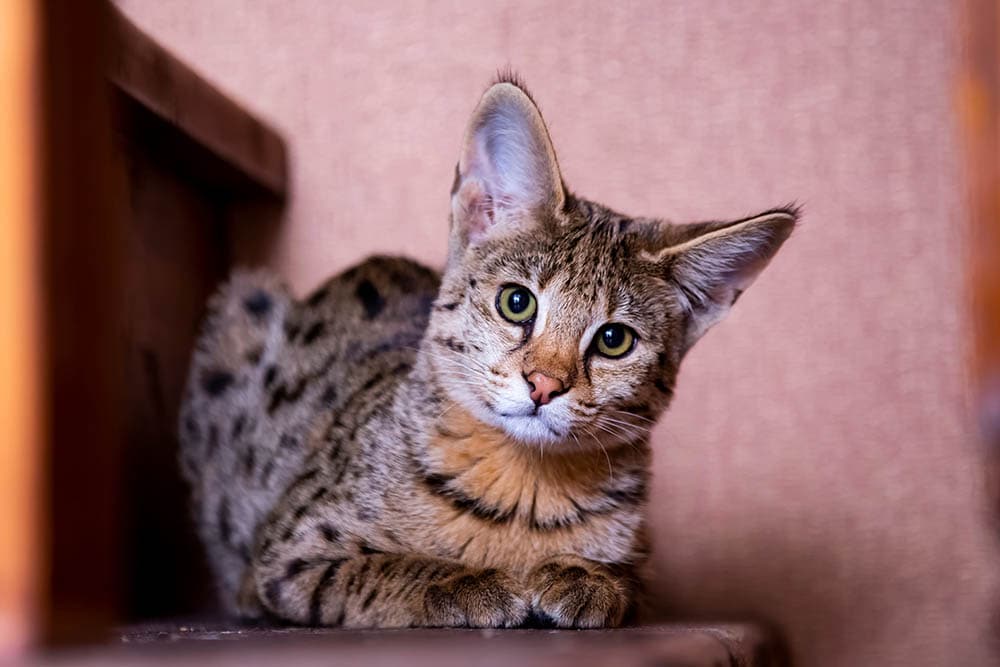
Training
Savannah Cats are easy to train, and due to their high activity level, many owners train them to be on a leash to enjoy the outdoors. This is best done at a young age.
Mental stimulation is vital since they are highly intelligent. Clicker training and interactive toys are helpful and will satisfy your kitty’s wild side. Videos of birds and squirrels will also be appreciated.
Health and Care
Savannah Cats are generally very healthy, with no breed-specific diseases known. Spaying and neutering are always recommended, even though male cats in the first three generations are usually sterile.
To keep your Savannah healthy and happy, you can provide a mentally stimulating environment with plenty of exercise and interaction. Their short fur coat requires very little maintenance beyond the occasional brushing. Make grooming time fun for your cat by providing toys during their session.
A Savannah will also need their nails trimmed regularly along with good dental care. Establishing a nail-trimming and tooth-brushing routine at a young age is vital so you’re not wrestling with a formidable, full-grown Savannah when it’s time for a manicure!
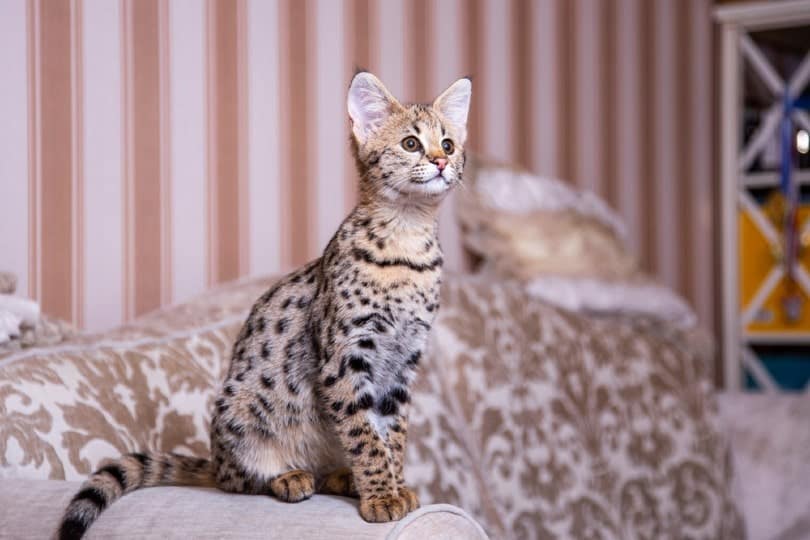
Breeding
Savannah cats came into existence in 1986 when a male wild African serval cat was crossed with a Siamese cat. The resulting offspring sported the exotic appearance of a wild animal with the more friendly temperament of the domestic mother.
Since the temperaments can vary significantly between generations, it’s essential to know that the early generations can be larger and much more wild than later generations.
Suitable for:
Savannah Cats are best suited for families and active owners who can spend a lot of time with them. Stimulating environments are essential to their health and happiness. Kids, other pets, and plenty of interactive toys will keep the Savannah busy.
With their natural prey instinct and high energy levels, they would rather be pouncing on toys and leaping up on a cat tree than spending the day in your lap. It’s important to remember that Savannahs have a wild side that needs to be respected and understood.
- Intelligent
- Easy to train
- Minimal grooming
- No known major health issues
- Highly active and needs stimulation
- Can’t be left alone for long periods
- Territorial
- Can have a wilder temperament, depending on breeding
Maine Coon Overview
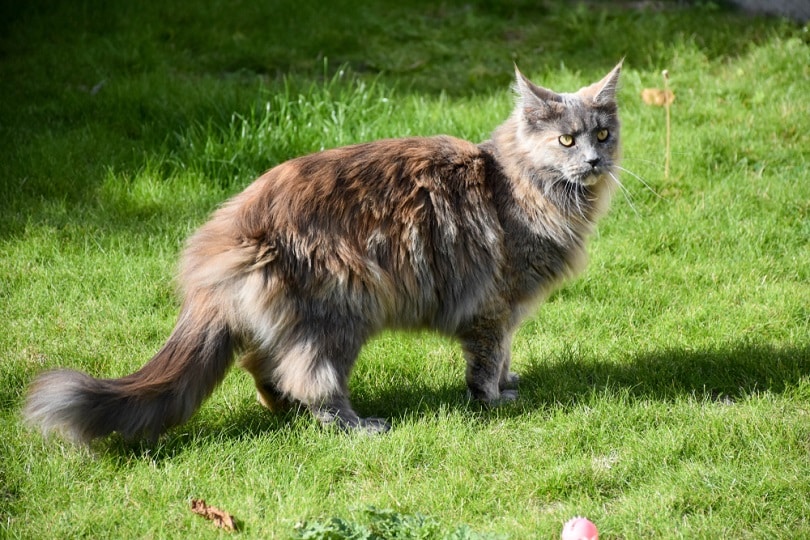
As the name suggests, the Maine Coon cat originated in the state of Maine and dates back to the late 1800s. They may have descended from long-haired European cats brought over by settlers. When the European cats were bred with the native, short-haired breeds, the Maine Coon cat was born and became the United States’ only native long-haired cat.
No one knows how the Maine Coon came by their name, but some people speculate that the bushy tail, which is similar to a raccoon’s tail, was the inspiration. The Maine Coon is the largest domestic cat, reaching up to 40 inches in length. Their long, fluffy fur protects them in the harsh New England weather and makes them look even bigger.
The Maine Coon has a sturdy build with a broad chest and muscular body. Their long coats are silky and smooth and come in various colors and patterns. You can find solid-colored cats that are black, white, or red, as well as tabby, bi-color, and calico. They have long, full tails and big ears with wisps of hair on top. Their oval eyes are warm and expressive.
Although they may be considered giants among cats, the Maine Coons have a gentle nature that has endeared them to families. They enjoy socializing and being nearby and are always up for some playtime. You also don’t have to worry about a mouse invasion because Maine Coons are exceptional hunters.
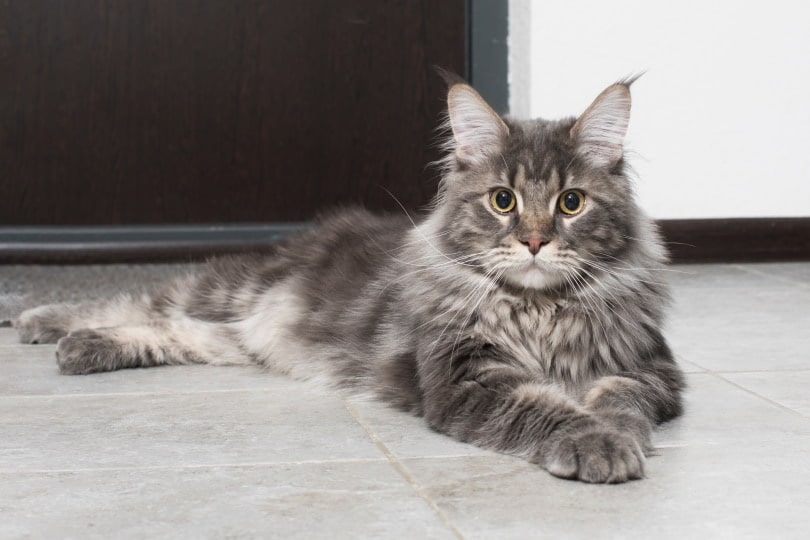
Personality and Character
With their affectionate nature and intelligence, Maine Coons do best with families and people who can spend time with them. They are highly social and love to follow you from room to room. They aren’t typically lap cats, which is probably a good thing considering their massive size. Maine Coons would rather hang out next to you.
If you’re looking for a cat that is good with children, Maine Coons are very tolerant and patient with them. Cuddling, petting, and holding are all welcome. Don’t worry if you have other pets in the home either—Maine Coons can get along well with both cats and dogs.
Besides accompanying you in your daily activities, they love to play! Attention and interaction keep them happy, and whether you get them a new toy or invite them to join you in your bath, they will have just as much fun.
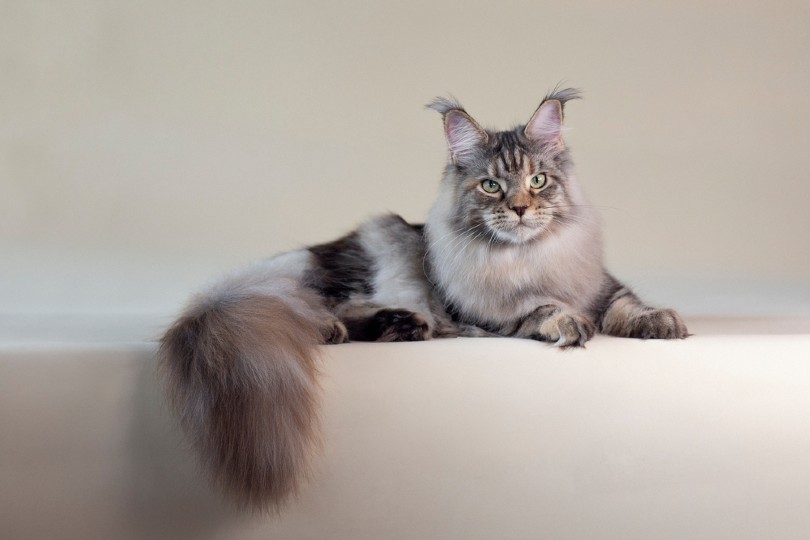
Training
Maine Coons are very intelligent and easy to train, especially if you start when they’re young. Housetraining is a simple matter, but make sure that you have a sizable litter box to accommodate them. Some owners have compared Maine Coons to dogs in their trainability—from walking on a leash to even playing fetch, they seemingly do it all.
Socialization is vital in the beginning. If you get a kitten, let each family member gently handle them every day. Any other pets should be introduced early as well. This early practice lays the foundation for a Maine Coon to be comfortable in their environment.
Health and Care
Because Maine Coons were allowed to develop for about 200 years, they are an overall healthy breed that can live up to 15 years. However, some issues can occur due to their size, such as arthritis and hip dysplasia. They are also susceptible to dental disease and hypertrophic cardiomyopathy (HCM). Regular screenings and checkups throughout your cat’s life will catch any health problems early on.
With a long, fluffy coat, the Maine Coon needs dedicated grooming and monthly baths. Fortunately, baths typically won’t be a problem since they love water! Regular brushing will keep their fur from getting tangled and pull out any loose hair that may otherwise end up all over your furniture.
Grooming doesn’t have to be a chore; Maine Coons love the attention, so it’s just another way to spend some quality time together.
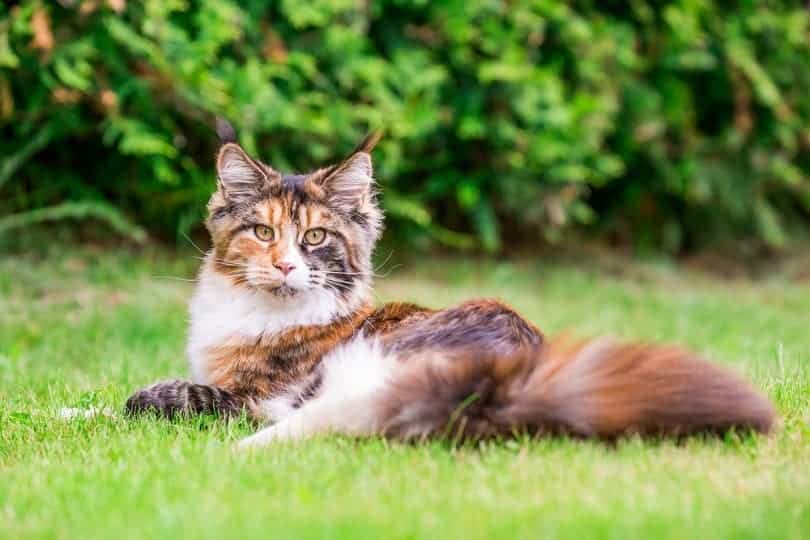
Suitable for:
Maine Coons are ideal for families with children and people who can be home with them most of the time. Playful interaction and companionship make them happy. Once socialized, they get along well with other pets.
- Good with children and other pets
- Easy to train
- Social and affectionate
- Requires more grooming
- Can’t be left alone for long periods
- Possible health issues
Which Breed Is Right For You?
Both the Savannah and the Maine Coon have attractive qualities, but they are very different felines that are suited to different environments. If you are active and want excitement in the home without stressing over something getting broken, the Savannah could be the one for you. They need an experienced cat owner who can handle the demands of a breed just one or two steps away from the jungle.
For first-time cat owners and families with young children, the Maine Coon is a perfect fit. They have plenty of energy to play and the intelligence to be easily trained. They will also enjoy the time you spend brushing their luxurious coat. In essence, the Maine Coon is happy to be a part of your life. With their patience and friendly nature, they quickly and easily become a beloved companion in the home.
See Also:
- Is a Maine Coon Savannah Mix Possible? What You Need to Know!
- Bengal vs. Savannah Cat: What’s the Difference? (With Pictures)
Featured Image Credit: Top: Savannah Cat: Jarry, Shutterstock | Maine Coon Cat: Aleksei Verhovski, Shutterstock

